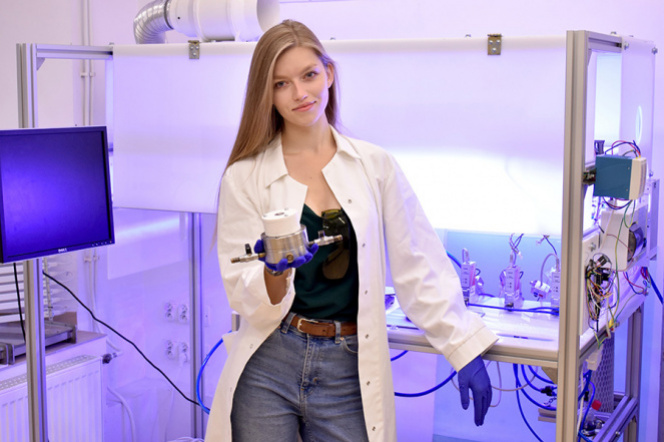Date added: 2021-10-18
Graduate of Chemical Faculty granted with an award named after Professor Romual Szczęsny

The award was granted for the master’s degree thesis under the name: “Synthesis and characterization of TiO2-based nanocomposites for photocatalytic degradation of pharmaceuticals in the water phase”, developed under the supervision of DSc Eng Anna Zielińska-Jurek, professor at Gdańsk University of Technology.
Pollutants resistant to degradation by traditional methods of sewage treatment, such as pharmaceuticals, constitute increasing danger to the environment on a global scale. Pharmaceutically active sewage sludge is emitted to waters as a result of their excessive consumption, improper utilization and insufficient effectiveness of the organic pollutants decomposition degradation techniques.
The awarded thesis concerns research on the methods of photocatalytic degradation of the pharmaceutical residue in water, using synthesis and characteristics of selected nanocomposites based on titanium dioxide (TiO2).
As a result, the outcome of the research presents the effect of pH and irradiation range on photocatalytic degradation of one pharmaceutical (etodolac) in the presence of core-shell magnetic photocatalyst. The obtained photocatalyst was applied for photocatalytic degradation of this pharmaceutical for the first time. On the basis of the conducted analyses, the complete pathway of photocatalytic degradation of etodolac was reported. Six intermediate products of decomposition were identified and a further path of their breakdown to simple compounds from the benzene derivative family was proposed.
The obtained nanocomposite is a promising material for the photocatalytic degradation of organic pollutants in the water phase on a technological scale. The high efficiency of etodolac degradation in the presence of a photocatalytic nanocomposite under the influence of simulated sunlight, at a specific pH of the environment, enables to use it as an alternative to conventional, ineffective for pharmaceuticals, wastewater treatment methods.
An additional advantage of the obtained photocatalyst is the possibility of its recovery after the photocatalytic process, using a magnetic field and its secondary use to purify another stream of pollutants. The use of hybrid nanocomposites with photocatalytic and magnetic properties enables the effective decomposition of chemicals difficult to degrade and reduces the costs of the wastewater treatment process by separating magnetic photocatalyst particles and their reuse.

